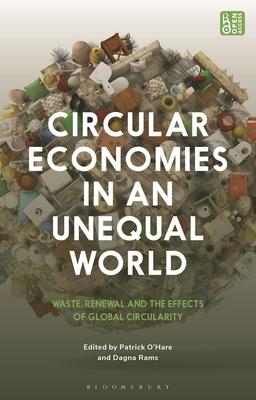This landmark first anthropological open access volume on the topic of 'circular economies' brings together a range of international scholars with regional specialisations in Europe, Africa, Asia, and South America to examine the concept's global implications.
Aspirations towards a circular economy have become increasingly prominent around the world, yet until now, social anthropology has largely neglected the potentially deep social impacts of this concept, despite its obvious implications through every level of the economy and society. This volume covers a diverse array of international actors, including waste-pickers, traders and policymakers, and the global movement of materials like metals, plastic and textiles. Through ethnographic and qualitative case studies, it exposes many of the tensions that exist between state and corporate ideals of the circular economy, and the vernacular practices and philosophies that exist around the world. Contributors examine the frictions that emerge as these concepts and materials travel across different geographic contexts, and ask - what can an anthropological analysis contribute to a concept that is increasingly reshaping economies and restructuring global flows of virgin commodities, recyclables, and waste? The ebook editions of this book are available open access under a CC BY-NC-ND 4.0 licence on bloomsburycollections.com. Open access was funded by UKRI.
Book
Circular Economies in an Unequal World: Waste, Renewal and the Effects of Global Circularity
(Write a Review)
Hardcover
$100.00
This landmark first anthropological open access volume on the topic of 'circular economies' brings together a range of international scholars with regional specialisations in Europe, Africa, Asia, and South America to examine the concept's global implications.
Aspirations towards a circular economy have become increasingly prominent around the world, yet until now, social anthropology has largely neglected the potentially deep social impacts of this concept, despite its obvious implications through every level of the economy and society. This volume covers a diverse array of international actors, including waste-pickers, traders and policymakers, and the global movement of materials like metals, plastic and textiles. Through ethnographic and qualitative case studies, it exposes many of the tensions that exist between state and corporate ideals of the circular economy, and the vernacular practices and philosophies that exist around the world. Contributors examine the frictions that emerge as these concepts and materials travel across different geographic contexts, and ask - what can an anthropological analysis contribute to a concept that is increasingly reshaping economies and restructuring global flows of virgin commodities, recyclables, and waste? The ebook editions of this book are available open access under a CC BY-NC-ND 4.0 licence on bloomsburycollections.com. Open access was funded by UKRI.Hardcover
$100.00